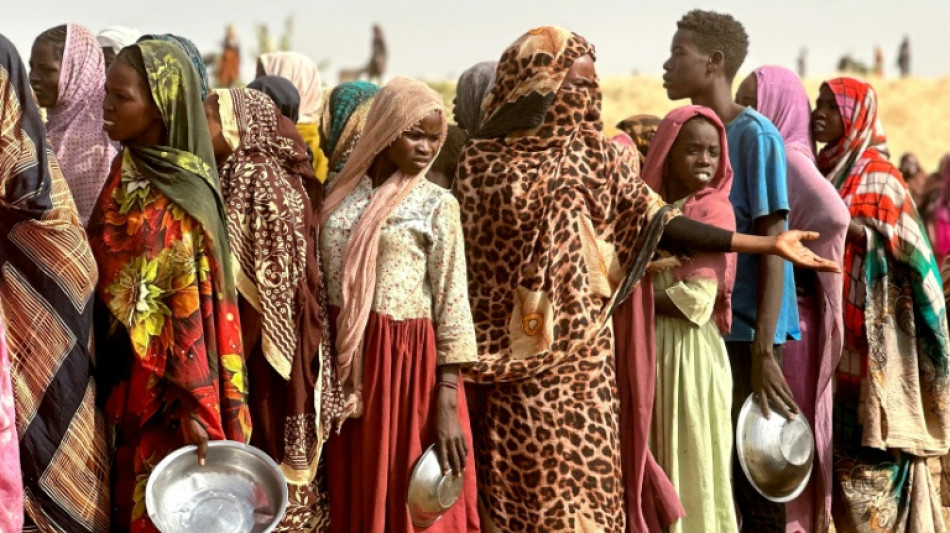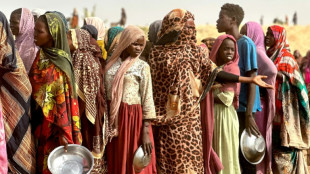
Sudan paramilitary chief declares rival government two years into war

Sudan's paramilitary declared on Tuesday the establishment of government rivalling the army-backed administration, two years into a war that has triggered the world's worst humanitarian crisis.
The war that erupted on April 15, 2023 has killed tens of thousands of people and displaced 13 million, with no sign of peace on the horizon.
The fighting has pitted the regular army, led by Abdel Fattah al-Burhan, against the paramilitary Rapid Support Forces, headed by his former deputy Mohamed Hamdan Daglo.
"On this anniversary, we proudly declare the establishment of the Government of Peace and Unity, a broad coalition that reflects the true face of Sudan," Mohamed Hamdan Daglo said in a statement on Telegram.
In late February, the RSF and its allies signed a charter in Kenya declaring the formation of a "government of peace and unity" in areas under their control.
Daglo added on Tuesday that the paramilitaries, along with "civil and political forces", had signed a transitional constitution, describing it as a "roadmap for a new Sudan".
That constitution provides for a 15-member presidential council "representing all regions, symbolising our voluntary unity".
Analysts have previously warned that the conflict could leave Sudan permanently divided between the warring sides, both of which face accusations of abuses.
With the RSF emboldened in Darfur, "the territorial division that's occurring could mean a de facto separation," said Sharath Srinivasan, a professor at Cambridge University who studies Sudan.
- Mass displacement -
At the start of the war, the capital Khartoum became a battleground, with bodies lining the streets, sending hundreds of thousands fleeing.
Those left behind struggled to survive.
"I've lost half my bodyweight," said 52-year-old Abdel Rafi Hussein, who stayed in the capital under RSF control until the army retook it last month.
"We're safe (now), but still, we suffer from a lack of water and electricity and most hospitals aren't working."
The army's recapture of Khartoum marked a turnaround after more than a year of setbacks.
Many civilians celebrated what they called the "liberation" of the capital from the RSF, whose fighters were accused of widespread looting and sexual violence.
But now the RSF is seeking to cement its grip on the vast western region of Darfur, where it has launched a deadly assault on El-Fasher -- the last major city in the region outside its control.
More than 400 people have been killed in the offensive, the United Nations said, with the paramilitaries having claimed control of the nearby Zamzam displacement camp on Sunday.
An estimated 400,000 civilians fled the famine-hit camp as the RSF advanced, according to the International Organization for Migration.
The army said on Tuesday that it had carried out "successful air strikes" against RSF positions northeast of the city.
In total, the conflict has displaced some 13 million people, 3.8 million of them abroad, according to UN figures.
- 'End the suffering' -
In London on Tuesday, officials from around the world were meeting to "agree a pathway to end the suffering" in Sudan, British Foreign Secretary David Lammy said.
But neither of the warring parties attended the meeting, where the African Union and European countries called for an end to the war.
Precise death tolls are not available because of the collapse of the healthcare system, but former US envoy Tom Perriello cited estimates last year of up to 150,000 dead.
On Tuesday, the UN said 2.1 million people are expected to return to Khartoum over the next six months following the army's recapture.
In central Sudan -- where the UN said nearly 400,000 people had returned to areas retaken by the army by March -- many have come back to ruins, preferring destitution at home to displacement.
Zainab Abdel Rahim, 38, returned to Khartoum North this month with her six children, to find their home looted beyond recognition.
"We're trying to pull together the essentials, but there's no water, no electricity, no medicine," she said.
According to Catherine Russell, executive director of the UN's children's agency, the war has "shattered the lives of millions of children across Sudan".
The Zamzam camp, which had been sheltering up to a million people, was the first place in Sudan where famine was declared.
Other nearby camps have followed and famine is expected to take hold in El-Fasher itself by next month.
On Monday, Guterres called for an end to "the external support and flow of weapons" fuelling the war.
"Those with greatest influence on the parties must use it to better the lives of people in Sudan -- not to perpetuate this disaster," he said, without naming any countries.
The army-backed government has accused the United Arab Emirates of arming the paramilitaries via neighbouring Chad, an accusation both Abu Dhabi and the RSF deny.
burs-bha/jsa/ser
U.Andre--PS

 London
London

 Manchester
Manchester
 Glasgow
Glasgow
 Dublin
Dublin
 Belfast
Belfast
 Washington
Washington
 Denver
Denver
 Atlanta
Atlanta
 Dallas
Dallas
 Houston Texas
Houston Texas
 New Orleans
New Orleans
 El Paso
El Paso
 Phoenix
Phoenix
 Los Angeles
Los Angeles



